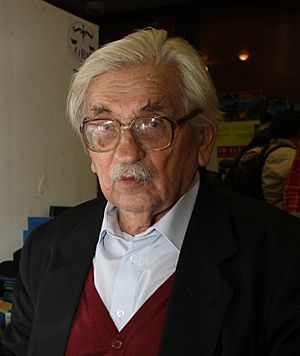Ludvík Vaculík facts for kids
Quick facts for kids
Ludvík Vaculík
|
|
|---|---|

Vaculík in 2010
|
|
| Born | 23 July 1926 Brumov-Bylnice, Czechoslovakia |
| Died | 6 June 2015 (aged 88) Dobřichovice, Czech Republic |
| Occupation | Writer Author Journalist |
| Nationality | Czech |
| Notable works |
|
Ludvík Vaculík (born July 23, 1926 – died June 6, 2015) was a Czech writer and journalist. He was born in Brumov, a town in what was then Czechoslovakia. Vaculík was famous for writing and sharing his work secretly. This secret way of publishing was called samizdat. He is best known for writing a very important document called the "Two Thousand Words" manifesto in June 1968.
Contents
Speaking Out: Before 1968
Before 1968, the leader of Czechoslovakia, Antonín Novotný, started to control writers and thinkers more strictly. This happened after a war in June 1967. In July, Vaculík, who was part of the Communist Party at the time, went to a meeting for writers.
At this meeting, Vaculík gave a powerful speech. He said that the Communist Party was too controlling. He also criticized the party for not letting people express themselves freely. Other writers at the meeting had mixed feelings. They were happy someone spoke the truth. But they also worried about what might happen next.
Novotný and his supporters tried to control the writers' group. But they failed. Vaculík's speech, and others like it, showed a growing disagreement. This disagreement helped lead to Novotný losing his power later on.
The Prague Spring and "Two Thousand Words"
Ludvík Vaculík was one of the most forward-thinking members of the Communist Party. He wanted faster and stronger changes than the new leader, Alexander Dubček. In January 1968, Dubček had started a period of reforms known as the Prague Spring.
Vaculík wanted to influence people before new party elections. So, on June 27, 1968, he released his important document. It was called "Two Thousand Words to Workers, Farmers, Scientists, Artists, and Everyone." This document was published in several big newspapers in Prague. Many other well-known people also signed it. This happened right after the government stopped censoring newspapers.
In the "Two Thousand Words," Vaculík asked people to take action. He suggested they demand that leaders who had misused their power should step down. He encouraged people to do this through criticism, protests, and even strikes. He also shared a worry. He was concerned that other countries, especially those in the Warsaw Pact, might interfere in Czechoslovakia.
Why the "Two Thousand Words" Mattered
The "Two Thousand Words" was written in a calm way. It still followed some ideas of Marxism. However, it asked ordinary people to act if there was military interference. This meant it challenged the Communist Party's main role.
The document became very popular across Czechoslovakia. Both thinkers and workers liked it. Its popularity grew even more after the Communist Party officially spoke against it. The "Two Thousand Words" also made the Soviet Union very worried.
After this document, the Soviet leader, Leonid Brezhnev, started using a new word. He called the Prague Spring a "counterrevolution." This was the first time he used this term. If a counterrevolution was happening, the Soviet Union believed its form of socialism was in danger. Because of this, they felt justified in sending troops from the Warsaw Pact into Czechoslovakia. This happened on August 20-21, 1968.
This idea, that force could be used if socialism was threatened, became known as the Brezhnev Doctrine. Vaculík's "Two Thousand Words" was a key step that led to this policy being used.
Vaculík as a Dissident Writer
After Gustáv Husák took power in 1969, censorship became much stricter. Vaculík was no longer a member of the Communist Party. He became part of a group of dissident writers in Czechoslovakia. Dissidents are people who disagree with the government and speak out.
In 1973, Vaculík started something called Edice Petlice. This means Edition Padlock. It was a series of books and writings published secretly, or samizdat. He ran this secret publishing house until 1979. Other writers also started their own secret series. They did this even though the secret police often bothered them. Some of these secret authors, including Vaculík, also had their works published in Western countries.
The main group of samizdat authors later created and signed a very important document. It was called Charter 77. Vaculík was at one of the planning meetings for this Charter in December 1976. On January 6, 1977, Vaculík, along with Václav Havel and an actor named Pavel Landovský, tried to mail a copy of Charter 77 to the Czechoslovak government. Their car was stopped by the secret police. All three were taken in for questioning. Other people who signed the Charter were also questioned and had their homes searched.
Later in 1978, Vaculík wrote an article called "Remarks on Courage." This article helped start a discussion about the Charter. Most of the original signers were educated people from big cities. Vaculík and others warned that they should not become too separate from everyday citizens. His criticism helped make sure that Charter 77 continued to be discussed and understood by more people.
Life After Communism
The official ban on Ludvík Vaculík's works was lifted in late 1989. He continued to write. He had a weekly column in a newspaper called Lidové noviny. In this column, he wrote short essays about different Czech political and cultural topics. This was similar to the secret writings he did during the time of Communism.
Death
Ludvík Vaculík passed away peacefully on June 6, 2015. He was 88 years old. He died in Dobřichovice, where he lived with his son.
See also
- Charter 77
- Libri Prohibiti
- Normalization (Czechoslovakia)
- Prague Spring
- Samizdat
 | Selma Burke |
 | Pauline Powell Burns |
 | Frederick J. Brown |
 | Robert Blackburn |

